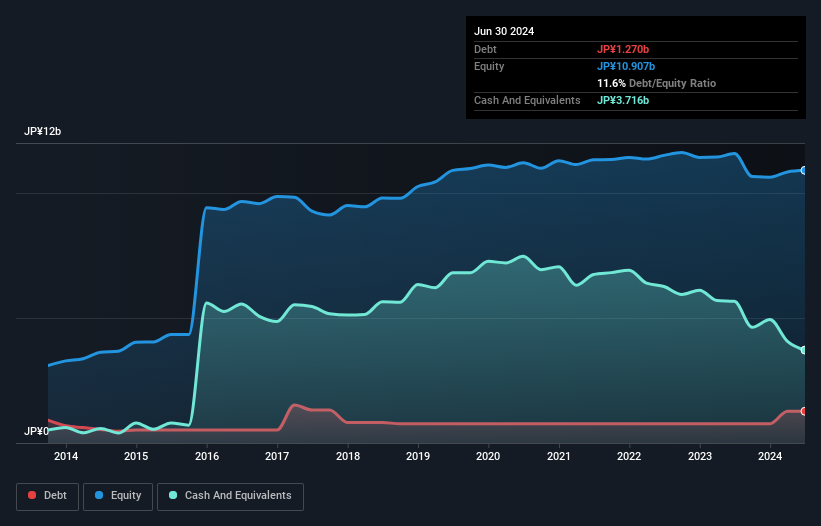Some say volatility, rather than debt, is the best way to think about risk as an investor, but Warren Buffett famously said that 'Volatility is far from synonymous with risk.' It's only natural to consider a company's balance sheet when you examine how risky it is, since debt is often involved when a business collapses. Importantly, Infomart Corporation (TSE:2492) does carry debt. But should shareholders be worried about its use of debt?
When Is Debt A Problem?
Generally speaking, debt only becomes a real problem when a company can't easily pay it off, either by raising capital or with its own cash flow. In the worst case scenario, a company can go bankrupt if it cannot pay its creditors. However, a more common (but still painful) scenario is that it has to raise new equity capital at a low price, thus permanently diluting shareholders. By replacing dilution, though, debt can be an extremely good tool for businesses that need capital to invest in growth at high rates of return. When we think about a company's use of debt, we first look at cash and debt together.
View our latest analysis for Infomart
What Is Infomart's Net Debt?
As you can see below, at the end of June 2024, Infomart had JP¥1.27b of debt, up from JP¥770.0m a year ago. Click the image for more detail. But it also has JP¥3.72b in cash to offset that, meaning it has JP¥2.45b net cash.

How Strong Is Infomart's Balance Sheet?
Zooming in on the latest balance sheet data, we can see that Infomart had liabilities of JP¥3.22b due within 12 months and liabilities of JP¥76.0m due beyond that. On the other hand, it had cash of JP¥3.72b and JP¥2.36b worth of receivables due within a year. So it actually has JP¥2.78b more liquid assets than total liabilities.
This surplus suggests that Infomart has a conservative balance sheet, and could probably eliminate its debt without much difficulty. Succinctly put, Infomart boasts net cash, so it's fair to say it does not have a heavy debt load!
On top of that, Infomart grew its EBIT by 73% over the last twelve months, and that growth will make it easier to handle its debt. When analysing debt levels, the balance sheet is the obvious place to start. But it is future earnings, more than anything, that will determine Infomart's ability to maintain a healthy balance sheet going forward. So if you're focused on the future you can check out this free report showing analyst profit forecasts.
Finally, a business needs free cash flow to pay off debt; accounting profits just don't cut it. While Infomart has net cash on its balance sheet, it's still worth taking a look at its ability to convert earnings before interest and tax (EBIT) to free cash flow, to help us understand how quickly it is building (or eroding) that cash balance. During the last three years, Infomart burned a lot of cash. While that may be a result of expenditure for growth, it does make the debt far more risky.
Summing Up
While we empathize with investors who find debt concerning, you should keep in mind that Infomart has net cash of JP¥2.45b, as well as more liquid assets than liabilities. And it impressed us with its EBIT growth of 73% over the last year. So we don't have any problem with Infomart's use of debt. The balance sheet is clearly the area to focus on when you are analysing debt. However, not all investment risk resides within the balance sheet - far from it. To that end, you should be aware of the 1 warning sign we've spotted with Infomart .
If, after all that, you're more interested in a fast growing company with a rock-solid balance sheet, then check out our list of net cash growth stocks without delay.
New: AI Stock Screener & Alerts
Our new AI Stock Screener scans the market every day to uncover opportunities.
• Dividend Powerhouses (3%+ Yield)
• Undervalued Small Caps with Insider Buying
• High growth Tech and AI Companies
Or build your own from over 50 metrics.
Have feedback on this article? Concerned about the content? Get in touch with us directly. Alternatively, email editorial-team (at) simplywallst.com.
This article by Simply Wall St is general in nature. We provide commentary based on historical data and analyst forecasts only using an unbiased methodology and our articles are not intended to be financial advice. It does not constitute a recommendation to buy or sell any stock, and does not take account of your objectives, or your financial situation. We aim to bring you long-term focused analysis driven by fundamental data. Note that our analysis may not factor in the latest price-sensitive company announcements or qualitative material. Simply Wall St has no position in any stocks mentioned.
Have feedback on this article? Concerned about the content? Get in touch with us directly. Alternatively, email editorial-team@simplywallst.com
About TSE:2492
Infomart
Operates an online business-to-business (BtoB) electronic commerce platform in Japan.
High growth potential with excellent balance sheet.
Market Insights
Community Narratives




